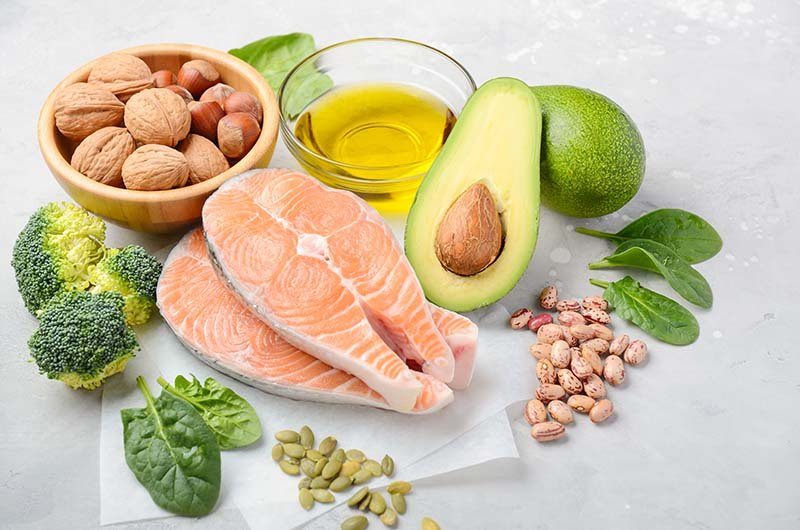Welcome to our comprehensive guide on nutrition for knee osteoarthritis (OA)! If you’re seeking ways to manage knee OA symptoms, promote joint health, and improve your overall quality of life, you’ve come to the right place. In this guide, we will delve into the importance of nutrition in knee OA management and provide valuable insights on foods, diets, and supplements that can support your knee health journey. Be sure to consult with your healthcare professional before making any significant changes to your diet or lifestyle.
At Greenbell Medical Clinic, our team of experts specializes in bone and muscle regenerative approaches. If you’re looking for personalized advice and consultation related to knee OA, don’t hesitate to reach out to us. Contact us at [020964698] or [service@greenbellclinic.com] to schedule a consultation and learn more about how we can assist you on your knee OA management journey.

Key Takeaways:
- Nutrition plays a crucial role in optimizing knee health for individuals with knee osteoarthritis (OA).
- Proper nutrition can help manage knee OA symptoms, promote joint health, and enhance overall well-being.
- Dietary adjustments, including incorporating anti-inflammatory foods and essential nutrients, can soothe knee OA pain and reduce inflammation.
- Weight management strategies and exercise combined with proper nutrition are essential for knee OA management.
- Scheduling a consultation with a dietitian and seeking professional guidance can provide personalized nutrition plans and support for knee OA.
Understanding Knee Osteoarthritis and Nutritional Impact
In this section, you will gain a better understanding of knee osteoarthritis (OA) and how nutrition plays a crucial role in its management. Knee OA is a degenerative joint disease that affects millions of people worldwide, causing pain, stiffness, and reduced mobility in the knee joints.
One factor that significantly affects knee OA progression is obesity. Excess weight places increased stress on the knee joints, leading to accelerated deterioration and heightened pain. Maintaining a healthy weight through proper nutrition can help slow down the progression of knee OA and alleviate symptoms.

The Role of Obesity in Knee OA Progression
Obesity can have a serious impact on knee osteoarthritis, leading to worsening symptoms and joint damage. The increased stress on the knee joint due to excess weight accelerates cartilage breakdown, causing inflammation, pain, and stiffness.
Studies have shown that for every kilogram of excess weight, the pressure on the knee joint increases four times during daily activities. Over time, this extra stress can contribute to the development of knee OA, and even people who have never had knee problems before can develop the condition.
Nutritional Interventions: A Preventive Approach
On the other hand, proper nutrition can play a preventive role in knee OA. Making dietary interventions and adopting a healthy lifestyle can help reduce the risk of developing knee OA or slow its progression.
Preventive measures for knee OA include maintaining a balanced diet rich in fruits, vegetables, whole grains, and lean proteins. These nutrient-dense foods provide essential vitamins, minerals, and antioxidants that promote joint health and reduce inflammation in the body.
Additionally, incorporating regular exercise into your routine can further support the preventive approach. Physical activity helps maintain a healthy weight, strengthens the muscles around the knee joints, and improves overall joint stability and flexibility.
By understanding the connection between knee osteoarthritis and nutrition, you can take proactive steps to optimize your knee health and improve your quality of life. In the next sections, we will explore key nutrients for knee joint health, dietary adjustments for pain management, and strategies for weight management in individuals with knee OA.
Key Nutrients for Knee Joint Health
Good nutrition plays an important role in maintaining the health of your knee joints, especially in the treatment of knee osteoarthritis (OA). Certain key nutrients can help support joint health and relieve symptoms associated with knee osteoarthritis. Including these nutrients in your diet may improve your quality of life and improve knee function.

Anti-Inflammatory Foods to Soothe Knee OA
One way to support knee health is by consuming anti-inflammatory foods. These foods can help reduce inflammation in the joints, easing pain and swelling associated with knee OA. Include the following anti-inflammatory foods in your diet:
- Fatty fish, such as salmon, mackerel, and sardines, which are rich in omega-3 fatty acids
- Colorful fruits and vegetables, such as berries, cherries, spinach, and kale, which are high in antioxidants
- Healthy fats, like olive oil and avocados, which contain anti-inflammatory properties
- Nuts and seeds, like walnuts and flaxseeds, which are packed with omega-3 fatty acids
- Spices, including turmeric and ginger, which have potent anti-inflammatory effects
By incorporating these foods into your diet, you can help reduce inflammation in your knee joints and alleviate knee OA symptoms.
The Importance of Omega-3 Fatty Acids
Omega-3 fatty acids are a specific type of healthy fats that provide numerous benefits for knee joint health. These fatty acids have been shown to reduce inflammation, promote joint lubrication, and decrease stiffness and pain associated with knee OA.
Include omega-3 fatty acid-rich foods in your diet, such as:
- Fatty fish, like salmon, tuna, and trout
- Flaxseeds and chia seeds
- Walnuts
- Soybeans and tofu
If it’s challenging to get enough omega-3 fatty acids through your diet alone, consider adding a high-quality fish oil supplement to ensure an adequate intake.
To visualize the key nutrients for knee joint health, refer to the table below:
| Nutrient | Sources |
|---|---|
| Omega-3 Fatty Acids | Fatty fish (salmon, mackerel, sardines), flaxseeds, chia seeds, walnuts, soybeans, tofu |
| Antioxidants | Berries, cherries, spinach, kale |
| Healthy Fats | Olive oil, avocados |
| Nuts and Seeds | Walnuts, flaxseeds |
| Spices | Turmeric, ginger |
By incorporating these key nutrients into your diet, particularly anti-inflammatory foods and omega-3 fatty acids, you can support your knee joint health and manage knee osteoarthritis more effectively.
Nutrition for Knee OA: Dietary Adjustments for Pain Management
Incorporating the right dietary adjustments can play a crucial role in managing pain associated with knee osteoarthritis (OA). By focusing on specific foods and nutrients, you can reduce inflammation, promote pain relief, and support overall knee health. Here are some practical tips and recommendations to help alleviate knee OA symptoms through nutrition:
- Opt for anti-inflammatory foods: Include foods that have anti-inflammatory properties in your diet. These foods can help reduce inflammation and alleviate knee pain. Some examples include:
- Fatty fish, such as salmon, mackerel, and sardines, rich in omega-3 fatty acids.
- Colorful fruits and vegetables, particularly berries, cherries, and leafy greens.
- Nuts and seeds, such as walnuts, almonds, and flaxseeds.
- Healthy fats, including avocado, olive oil, and coconut oil.
- Berries, such as blueberries, strawberries, and raspberries.
- Dark chocolate.
- Colorful fruits and vegetables, like oranges, spinach, and bell peppers.
- Calcium-rich foods, such as dairy products, leafy greens, and fortified plant-based milks.
- Vitamin C-rich foods, like citrus fruits, bell peppers, and broccoli.
- Vitamin D sources, such as fatty fish, eggs, and fortified cereals.
- Protein-rich foods, including lean meats, poultry, fish, legumes, and tofu.
- Magnesium-rich foods, like whole grains, nuts, seeds, and leafy greens.
By making these dietary adjustments and incorporating pain-relieving foods into your daily meals, you can manage knee OA pain more effectively and support your overall knee health.
The Link Between Body Weight and Knee Osteoarthritis
One of the most important factors that can contribute to the development and progression of knee osteoarthritis (OA) is body weight. Excess weight increases pressure on the joints, especially the knees, leading to accelerated deterioration of the joints and increased pain. Body weight management is critical for people with knee osteoarthritis to relieve symptoms and maintain joint health.
Weight Management Strategies for Knee OA
If you have knee OA, incorporating weight management strategies into your lifestyle can have a significant impact on your knee health. Here are some effective strategies to consider:
- Healthy eating: Adopting a balanced and nutritious diet can help you maintain a healthy weight. Focus on consuming whole foods, such as fruits, vegetables, lean proteins, whole grains, and healthy fats, while limiting processed and sugary foods.
- Portion control: Pay attention to portion sizes and practice mindful eating. By listening to your body’s hunger and fullness cues, you can avoid overeating and promote weight management.
- Regular physical activity: Engaging in regular exercise is essential for weight management and overall joint health. Choose low-impact activities, such as swimming, cycling, or walking, to reduce stress on your knees.
- Seek support: Consider joining a weight management program or seeking assistance from a healthcare professional, such as a registered dietitian or a physical therapist, who can provide guidance and support tailored to your specific needs.
By implementing these strategies, you can gradually achieve and maintain a healthy body weight, reducing the burden on your knees and improving your overall knee health.
Success Stories: Weight Loss Impact on Knee Health
There are numerous success stories of individuals who have experienced significant improvements in their knee health through weight loss. Losing even a moderate amount of weight can relieve pressure on the knees and improve joint function.
“After losing 20 pounds, I noticed a remarkable difference in my knee pain. I can now move more freely and perform daily activities without constant discomfort. Losing weight has truly transformed my knee health and overall quality of life.” – Rebecca
Rebecca’s story is just one example of how weight loss can positively impact knee health. By shedding excess pounds, many individuals have experienced reduced inflammation, decreased pain, and improved mobility in their knees.
If you’re struggling with knee OA and have been advised to lose weight, take inspiration from these success stories and commit to your weight management journey. Remember, every pound lost can make a significant difference in alleviating knee pain and improving your overall well-being.
Supplements: Do They Help with Knee Osteoarthritis?
When treating knee osteoarthritis, many people turn to nutritional supplements to support joint health. Common supplements such as glucosamine and chondroitin are known to provide potential benefits for knee osteoarthritis. However, it is important to understand the scientific evidence behind these supplements and their effectiveness in reducing knee osteoarthritis symptoms.
Glucosamine is a natural compound in the body known for its role in maintaining cartilage health. Some research suggests that taking glucosamine supplements may help reduce pain and improve joint function in people with knee osteoarthritis.
Chondroitin, another popular dietary supplement, is believed to have beneficial effects on joint health by reducing inflammation and promoting cartilage repair. Although research on its effectiveness is mixed, some studies have shown positive outcomes in terms of pain relief and improved mobility.
While these supplements may offer some potential benefits, it’s important to note that individual responses may vary. It’s advisable to consult with a healthcare professional or a registered dietitian before starting any new supplement regimen. They can provide personalized guidance and help determine whether these supplements are appropriate for your specific condition.
It’s worth mentioning that dietary supplements should never replace a well-balanced diet and a healthy lifestyle. Nutritious food choices and regular exercise play crucial roles in managing knee osteoarthritis and supporting overall joint health.
Creating a Knee-Friendly Diet Plan
When managing knee osteoarthritis (OA), following a knee-friendly diet plan can be an effective strategy to support joint health and alleviate symptoms. By incorporating nutrient-rich foods and implementing meal planning tips, you can optimize your knee health and improve your overall well-being.
Meal Planning Tips for Optimal Knee Health
To ensure you’re providing your knees with the necessary nutrients, consider the following meal planning tips:
- Include a variety of fruits and vegetables rich in antioxidants and anti-inflammatory properties, such as berries, leafy greens, and colorful peppers.
- Incorporate lean proteins like fish, poultry, tofu, and legumes to support muscle strength and repair.
- Choose whole grains such as quinoa, brown rice, and oats for their fiber content and to promote weight management.
- Limit processed and sugary foods, as they can contribute to inflammation and weight gain.
- Drink plenty of water throughout the day to stay hydrated and support joint function.
Remember to listen to your body and make adjustments as needed. Consulting with a dietitian can provide personalized guidance on the ideal meal plan to suit your specific needs and preferences.
Incorporating Superfoods into Your Diet
Superfoods are packed with nutrients that can benefit your knee health and overall well-being. Consider adding the following superfoods to your knee-friendly diet plan:
- Salmon: Rich in omega-3 fatty acids, salmon can help reduce inflammation and promote joint health.
- Spinach: Full of antioxidants, vitamins, and minerals, spinach can provide important nutrients for healthy joints.
- Blueberries: These berries are known for their anti-inflammatory properties and can contribute to overall joint health.
- Turmeric: The active compound in turmeric, curcumin, has potent anti-inflammatory effects and can help alleviate knee OA symptoms.
- Walnuts: Packed with omega-3 fatty acids, walnuts can promote joint lubrication and reduce knee pain.
By incorporating these superfoods into your diet, you can naturally support your knee health and manage knee osteoarthritis symptoms.
Proactive Knee Care: Exercise and Nutrition Combined
Incorporating both exercise and nutrition into your knee care routine is key to promoting joint health and managing symptoms of knee osteoarthritis (OA). By combining these two essential elements, you can proactively support your knee health and improve your overall well-being.
The Synergistic Relationship:
Maintaining healthy knees requires a combination of exercise and diet. Regular physical activity strengthens the muscles around the knee joint, providing more support and stability. It can also improve flexibility and range of motion and reduce stiffness and pain. Combining exercise with proper nutrition increases these benefits and optimizes knee health and overall quality of life.
“Exercise is king, nutrition is queen. Together, you have a kingdom for knee health.”
Practical Tips for Incorporating Exercise and Nutrition:
Here are some practical tips to help you integrate exercise and a healthy diet into your knee care routine:
- Choose low-impact exercises: Engage in activities such as swimming, cycling, or walking, which place minimal stress on your knees while still providing cardiovascular benefits.
- Include strength training: Incorporate exercises that target the muscles around your knees, such as leg presses, squats, or lunges. Building strength in these muscles can help reduce strain on your knee joints.
- Eat a balanced diet: Focus on consuming nutrient-dense foods that support joint health, such as fruits, vegetables, whole grains, lean proteins, and healthy fats.
- Stay hydrated: Drink plenty of water throughout the day to maintain joint lubrication and promote overall well-being.
- Consult a healthcare professional: If you have any existing health conditions or concerns, it’s important to seek guidance from a healthcare professional or a registered dietitian who can provide personalized advice tailored to your specific needs.
By adopting these proactive measures, you can take control of your knee health and actively manage your knee OA symptoms. Remember to listen to your body and make adjustments to your exercise and diet as needed.
Stay committed to a comprehensive approach that combines exercise and nutrition for optimal knee care. By prioritizing your knee health, you can continue to live an active, pain-free life.
Overcoming Challenges: Adapting Your Diet for Knee OA
Living with knee osteoarthritis (OA) presents unique challenges when it comes to maintaining a healthy diet. However, with the right strategies and adjustments, you can still enjoy a nourishing and flavorful eating plan that supports your knee health. In this section, we will explore how to overcome dietary restrictions and provide shopping and cooking tips to optimize your nutritional intake.
Dealing with Dietary Restrictions
When managing knee OA, it’s important to be aware of any dietary restrictions or limitations that may apply to you. Consulting with a healthcare professional or a registered dietitian can help you identify specific foods or ingredients that may exacerbate your symptoms or interfere with your medications. By understanding and adhering to these recommendations, you can create a diet plan that promotes optimal knee health.
Shopping and Cooking for Knee Health
When shopping for ingredients, focus on selecting foods that are rich in nutrients beneficial for knee health. Look for anti-inflammatory options, such as leafy greens, fatty fish, and berries, which can help reduce inflammation in the joints. Incorporating nuts, seeds, and whole grains into your shopping list can provide essential vitamins and minerals that support joint lubrication and overall knee health.
When it comes to cooking, it’s important to maximize the nutritional value of your meals. Opt for cooking methods such as baking, grilling, or steaming, which help retain the nutrients in your ingredients. Avoid deep-frying or using excessive amounts of oil, as it can contribute to excess weight gain and inflammation.
To add flavor to your dishes, experiment with herbs, spices, and low-sodium seasonings instead of relying on salt. This can help reduce sodium intake and minimize water retention, which may alleviate knee pain and swelling. Additionally, consider using healthy fats like olive oil or avocado oil to add richness to your meals while providing beneficial nutrients.
By implementing these shopping and cooking tips, you can create delicious and nutritious meals that promote knee health and support your overall well-being. Remember to consult with a healthcare professional or a registered dietitian to tailor your diet plan to your specific needs and dietary restrictions.
Professional Guidance on Knee OA Nutrition: When to Seek Help
When it comes to optimizing your knee health through nutrition, seeking professional guidance can make a significant difference in managing knee osteoarthritis (OA) effectively. A registered dietitian can provide personalized plans tailored to your specific needs and help you make informed dietary choices to support your knee health.
Consulting with Dietitians for Personalized Plans
A dietitian specializes in nutrition and can offer expert advice on dietary adjustments for knee OA management. They will assess your current diet, medical history, and individual goals to develop personalized nutrition plans that focus on relieving symptoms, reducing inflammation, and promoting joint health.
“A dietitian can help you understand the impact of your diet on knee OA symptoms and guide you toward making the right dietary choices that can alleviate pain and improve your overall knee health.”
Through one-on-one consultations, dietitians can address specific dietary concerns, answer your questions, and provide ongoing support on your journey toward better knee health. They can help you navigate challenges such as dietary restrictions, food sensitivities, and weight management, ensuring that you have a well-rounded approach to nutrition for knee OA.
Greenbell Medical Clinic’s Approach to Nutrition and Knee Health
Greenbell Medical Clinic, a specialized clinic renowned for its expertise in bone and muscle regenerative approaches, offers a comprehensive approach to nutrition and knee health. Their team of healthcare professionals, including dietitians, works closely with patients to develop personalized nutrition plans that complement their innovative treatment strategies.
At Greenbell Medical Clinic, their dedicated dietitians understand the unique nutritional needs of individuals with knee OA. They combine evidence-based research with a holistic approach to design nutrition plans that focus on reducing inflammation, strengthening joints, and promoting overall knee health.
By incorporating the latest advances in regenerative medicine with expert guidance on nutrition, Greenbell Medical Clinic aims to empower patients to take control of their knee health and experience positive transformations in their daily lives.
Future of Knee OA Management: Innovations in Nutrition Therapy
Innovations in nutrition therapy are paving the way for a promising future in knee osteoarthritis (OA) management. Researchers and healthcare providers are constantly exploring new approaches and emerging trends to improve the nutritional support available for individuals with knee OA. These advancements aim to enhance symptom management, promote joint health, and optimize overall well-being.
One key area of innovation in knee OA management is the development of specialized nutrition therapy tailored to the specific needs of patients. This approach goes beyond generalized dietary recommendations and takes into account individual factors such as age, body composition, and comorbidities. By providing personalized nutrition plans, healthcare professionals can address the unique challenges that each patient with knee OA may face.

“Innovations in nutrition therapy offer a holistic approach to knee osteoarthritis management, combining the power of food and nutrients to support joint health and alleviate symptoms,” says Dr. Samantha Lee, a renowned nutrition expert.
Advances in nutritional research have also shed light on the role of specific nutrients and bioactive compounds in knee OA management. Studies suggest that certain nutrients, such as vitamin D, antioxidants, and polyphenols, may have protective effects on joint health and reduce inflammation. Introducing these nutritional elements into the diet through whole foods or supplements may offer promising therapeutic benefits for individuals with knee OA.
As the field of nutrigenomics continues to expand, scientists are exploring the potential of personalized nutrition plans based on an individual’s genetic profile. This innovative approach considers genetic variations that may influence an individual’s response to specific nutrients. By understanding these genetic factors, healthcare practitioners can develop targeted nutrition interventions to optimize knee health and improve outcomes for patients with knee OA.
The future of knee OA management also involves harnessing the power of technology to facilitate nutrition therapy. Mobile applications and wearable devices are being developed to track dietary habits, monitor nutrient intake, and provide personalized recommendations. This integration of technology with nutrition therapy empowers individuals with knee OA to take an active role in managing their condition and making informed choices about their diet.
Key Takeaways:
- Innovations in nutrition therapy are shaping the future of knee OA management.
- Specialized nutrition plans cater to the unique needs of individuals with knee OA.
- Specific nutrients and bioactive compounds play a crucial role in promoting joint health and reducing inflammation.
- Personalized nutrition plans based on genetic profiles offer targeted interventions for improved outcomes.
- Technology integration, such as mobile applications and wearable devices, enhances nutrition therapy.
| Innovations in Nutrition Therapy | Key Advancements |
|---|---|
| Personalized Nutrition Plans | Addressing individual needs and challenges in knee OA management. |
| Specific Nutrient Focus | Highlighting the role of key nutrients in joint health and inflammation reduction. |
| Nutrigenomic Approaches | Using genetic variations to develop targeted nutrition interventions. |
| Technology Integration | Utilizing mobile apps and wearable devices for dietary tracking and support. |
Conclusion
Optimizing your knee health through proper nutrition is crucial for managing knee osteoarthritis (OA) and improving your overall quality of life. By understanding the impact of nutrition on knee OA and implementing dietary adjustments, you can alleviate symptoms, reduce inflammation, and support joint health.
Key takeaways from this nutrition guide include the importance of maintaining a healthy body weight to minimize stress on your knees. Incorporating anti-inflammatory foods, such as fruits, vegetables, and whole grains, can help soothe knee OA symptoms and reduce joint inflammation. Additionally, incorporating omega-3 fatty acids into your diet through sources like fatty fish or supplements can enhance joint lubrication and alleviate stiffness and pain associated with knee OA.
Remember, a knee-friendly diet plan goes hand in hand with regular exercise. By combining physical activity with proper nutrition, you create a proactive approach to knee care. And don’t forget, if you face challenges in adapting your diet or need personalized guidance, consulting with a dietitian can provide invaluable support on your journey to knee health.
Optimizing your knee health is within reach. By implementing the insights and strategies discussed in this guide, you can take control of your knee osteoarthritis and improve your overall well-being. Remember to always prioritize your knee health and make nutrition a pillar of your knee OA management plan.
FAQ
What is the role of nutrition in managing knee osteoarthritis (OA) symptoms?
Nutrition plays a crucial role in managing knee OA symptoms by reducing inflammation, promoting joint health, and improving overall quality of life. Certain foods and nutrients can help soothe knee pain, reduce stiffness, and support joint lubrication.
How does obesity affect knee osteoarthritis progression?
Excess weight places increased stress on the knee joints, accelerating the progression of knee OA. Maintaining a healthy body weight is essential to reduce the strain on the knees and alleviate symptoms associated with knee OA.
Are there dietary interventions that can help prevent knee osteoarthritis?
Yes, adopting a healthy diet and making lifestyle changes can help reduce the risk of developing knee OA. Consuming a balanced diet rich in anti-inflammatory foods, maintaining a healthy body weight, and incorporating regular exercise can all contribute to the prevention of knee OA.
What are the key nutrients for maintaining knee joint health?
Several nutrients are essential for maintaining knee joint health, including omega-3 fatty acids, vitamin C, vitamin D, and antioxidants. These nutrients support joint lubrication, reduce inflammation, and promote cartilage health.
How can anti-inflammatory foods soothe knee osteoarthritis symptoms?
Anti-inflammatory foods such as fatty fish, berries, leafy greens, and nuts can help reduce inflammation in the joints and alleviate knee OA symptoms. These foods contain compounds that possess anti-inflammatory properties, providing relief from pain and swelling.
What is the importance of omega-3 fatty acids for knee osteoarthritis?
Omega-3 fatty acids have been found to reduce joint stiffness and pain associated with knee OA. These healthy fats help lubricate the joints, reduce inflammation, and promote overall joint health. Good dietary sources of omega-3 fatty acids include fatty fish, chia seeds, flaxseeds, and walnuts.
Are there specific dietary adjustments that can help with knee osteoarthritis pain management?
Yes, making certain dietary adjustments can help manage knee OA pain. Including foods with anti-inflammatory properties, such as turmeric, ginger, and green tea, can help reduce inflammation and alleviate pain. Additionally, consuming foods rich in antioxidants and omega-3 fatty acids can support overall joint health.
How does body weight impact knee osteoarthritis?
Excess body weight increases the load and stress on the knee joints, contributing to the progression of knee OA. Maintaining a healthy body weight is crucial for reducing strain on the knees and improving knee health.
What are some effective weight management strategies for knee osteoarthritis?
Effective weight management strategies for knee OA include adopting a balanced and calorie-controlled diet, incorporating regular physical activity, and seeking guidance from healthcare professionals or a dietitian. These approaches can help individuals achieve and maintain a healthy body weight, reducing the burden on the knees.
Can supplements help with knee osteoarthritis?
Certain supplements, such as glucosamine and chondroitin, have been studied for their potential benefits in reducing knee OA symptoms. However, more research is needed to fully understand their effectiveness. It is recommended to consult with a healthcare professional before starting any supplements.





